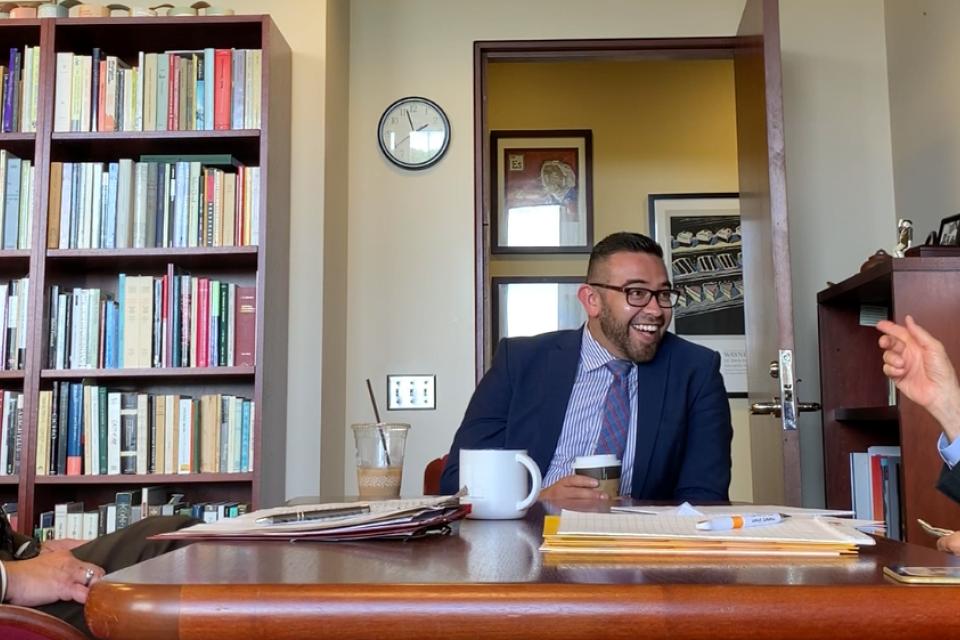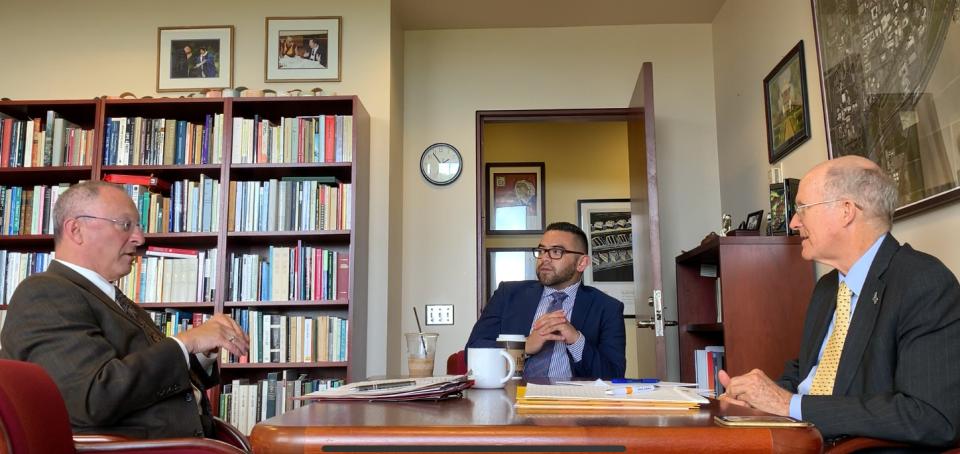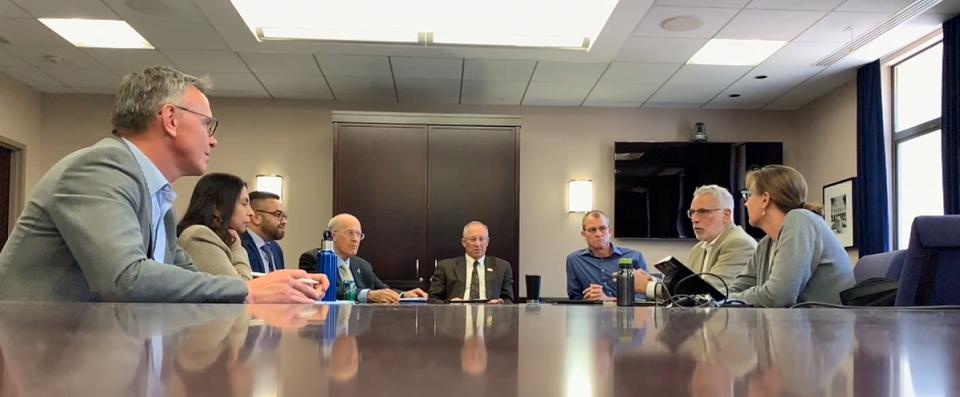One-on-One with UC Davis Provost
Rare opportunity to shadow Ralph Hexter

What is it like overseeing the day-to-day operations of one of the world’s most comprehensive research universities—literally a 5,300-acre city unto itself—with nearly 40,000 students, 4,700 faculty and 17,000 staff?
I recently had the privilege of an inside look at the daily routine of UC Davis Provost and Executive Vice Chancellor Ralph Hexter, the campus’ chief academic and operating officer.
My opportunity came via Chancellor Gary May’s UC Davis Leadership Job Shadow Program, which encourages undergraduate and graduate students to learn more about UC Davis by spending a day with a campus leader.
Students participate in meetings, attend events, meet other staff and faculty, and learn about the functions of the university. Likewise, campus leaders gain insight from the experiences and perspectives of the students.
My behind-the-scenes visit with Hexter opened my eyes to the University’s interworkings, built my appreciation for strategic leadership and offered the chance to network with top officials.
One-On-One and DACA Journey
During our first meeting of the day, I had the opportunity to share with Hexter a little about myself. As a UC Davis alumnus, first-year Sacramento Part-Time MBA student and working professional, I shared my experience as an undocumented college student, and summed up my journey with the Deferred Action for Childhood Arrivals immigration policy known as DACA.
I was happy to hear Hexter’s point of view as he described the University of California’s current legal battle to defend DACA, and UC Davis’ commitments to our DACA student population.
In 2017, Chancellor Gary May addressed the White House’s decision to end the 2012 executive order which allowed undocumented young people who were brought to the U.S. under the age of 16 to apply for two-year work permits and be protected from deportation during that time. May said abandoning the DACA program, “runs counter to the University of California principles of open and equal access to higher education for students of all backgrounds. Turning our backs on these students is not who we are.”

Global Expansion and Influence
I also learned about Hexter’s goal to further raise UC Davis’ visibility and establish a greater footprint globally to attract a greater diversity of international scholars, researchers and faculty. This is a big undertaking, and he has the backing of the entire university system.
As the chief academic chair and operating officer, Hexter’s direct reports include the deans of the four colleges and six professional schools; the vice provost/deans of Undergraduate Education and of Graduate Education; the vice provosts for Academic Affairs and for Global Affairs; the CIO/vice provost for Information and Educational Technology; the university librarian; the directors of both the Mondavi Center for the Performing Arts and the Jan Shrem and Maria Manetti Shrem Museum of Art; and the chief of police and chief compliance officer.
During my shadow I was able to be a fly on the wall during a meeting with Hexter and vice provosts to discuss campus issues and events. Topics ranged from graduation ceremony logistics to employee resource sharing.
Three Key Takeaways
The day’s meetings and our conversations left me with three profound takeaways:
- Importance of Fundraising Efforts
During our meeting with Vice Chancellor for Development and Alumni Relations Shaun Keister, I learned about UC Davis’ fundraising efforts and the importance of engaging corporate and individual donations to support UC Davis. It was interesting to hear about the fundraising progress of the two largest colleges: the College of Agriculture and Environmental Sciences and the College of Letters and Science.
2. Promote Equal Opportunity and Inclusion
One of the most interesting aspects about Hexter is that he has long been an LGBTQ leader in higher education. In all of his leadership positions, Hexter has made it a priority to foster excellence across the full range of disciplines, and to promote equal opportunity, diversity, and inclusion for students, faculty, and staff. Hexter also helped found the LGBTQ Presidents in Higher Education organization.
I learned that he and several other LGBTQ presidents and deans from across U.S. college campuses are collaborating on a book on leadership in higher education through an LGBTQ lens.
3. Sexual Assault Response and Resources
One of the most rewarding aspects about my time with Hexter is that on various occasions throughout the day he asked my opinion on various topics. When we spoke about the campus’ response to sexual assault, I offered my two cents on how we can help promote a culture that empowers all students to speak up, and debunks stereotypes of gender roles. It’s important to remember that sexual assault can happen to anyone. We need to continue to work to take steps to educate our communities to limit these instances and provide critical resources when they do occur.
UC Davis offers several different resources for victims of sexual violence, including university advocates, counseling services, academic and staff assistance, family protection, legal assistance and much more. UC Davis has set up all resources on their site for sexual violence prevention and response.

Looking Ahead
Opening the doors and granting a behind-the-scenes tour for undergraduate and graduate students is yet another example of what makes our UC Davis campus so great. This was my opportunity to see what makes a top-5 public university remain a top-5 public university, and I am sure that under Hexter’s leadership, UC Davis will continue its upward momentum, now and in the future.